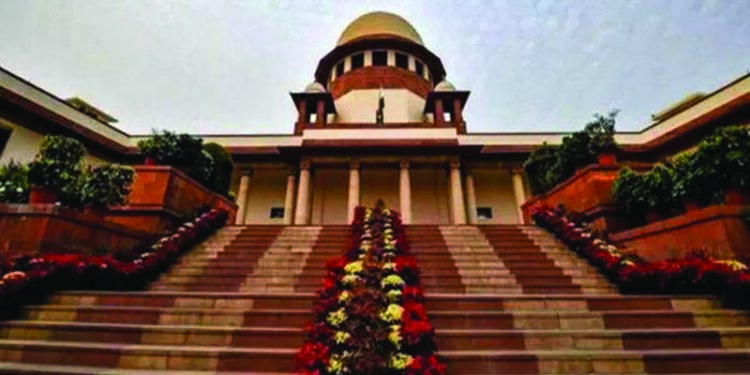NE LEGAL BUREAU
NEW DELHI, AUG 10
Political parties have to publish information regarding criminal antecedents of candidates on the homepage of their websites, the Supreme Court said on Tuesday.
The apex court directed the Election Commission of India (ECI) to create a dedicated mobile application containing information published by the candidates regarding their criminal antecedents so that voter gets information on his or her mobile phone at one stroke.
A bench of justices R F Nariman and B R Gavai passed these directions in its verdict on a plea seeking contempt action against several political parties including the BJP and the Indian National Congress for non-compliance of its February 13, 2020 directions during Bihar assembly polls last year.
The top court said in furtherance of the directions issued by a constitution bench in September 2018 and also in February last year, it is necessary to issue further directives in order to make the right of information of voters more effective and meaningful.
“Political parties are to publish information regarding criminal antecedents of candidates on the homepage of their websites, thus making it easier for the voter to get to the information that has to be supplied. It will also become necessary now to have on the homepage a caption which states ‘candidates with criminal antecedents’,” the bench said in its 71-page verdict.
The bench modified one of its earlier directions given in its February last year order on furnishing of details about the criminal antecedents of candidates.
“We clarify that the direction in paragraph 4.4 of our order dated February 13, 2020 be modified and it is clarified that the details which are required to be published, shall be published within 48 hours of the selection of the candidate and not prior to two weeks before the first date of filing of nominations,” it said.
It also directed the ECI to carry out an extensive awareness campaign to make every voter aware about his right to know and the availability of information regarding criminal antecedents of all contesting candidates.
The bench said this shall be done across various platforms, including social media, websites, TV ads, prime time debates, pamphlets and others and a fund must be created for this purpose within a period of four weeks.
“For the aforesaid purposes, the ECI is also directed to create a separate cell which will also monitor the required compliances so that this court can be apprised promptly of non-compliance by any political party of the directions contained in this court’s orders, as fleshed out by the ECI, in instructions, letters and circulars issued in this behalf,” it said.
The apex court held several political parties guilty of its contempt in 2020 Bihar assembly polls for disobeying an order requiring them to publish antecedents of candidates within 48 hours of selection or not less than two weeks before filing of nominations and imposed varying fines on them.
It directed that fine imposed for contempt of court in the matter may be directed to be paid in the fund which must be created within four weeks.
“We reiterate that if such a political party fails to submit such compliance report with the ECI, the ECI shall bring such non-compliance by the political party to the notice of this court as being in contempt of this court’s orders/directions, which shall in future be viewed very seriously,” it said.
In its February last year verdict aimed at decriminalising Indian politics, the apex court had directed the political parties to upload on their websites and social media platforms the details of pending criminal cases against their candidates and the reasons for selecting them as also for not giving ticket to those without criminal antecedents.
It had said these details should be published within 48 hours of the selection of the candidate or at least two weeks before the first date for filing of nominations, whichever is earlier.
The details should also be published on official social media platforms of the political parties, including Facebook and Twitter, and also in one local vernacular and one national newspaper, the apex court had directed.
In September 2018, a five-judge constitution bench had unanimously held that all candidates will have to declare their criminal antecedents to the Election Commission before contesting polls and called for a wider publicity, through print and electronic media about antecedents of candidates.









